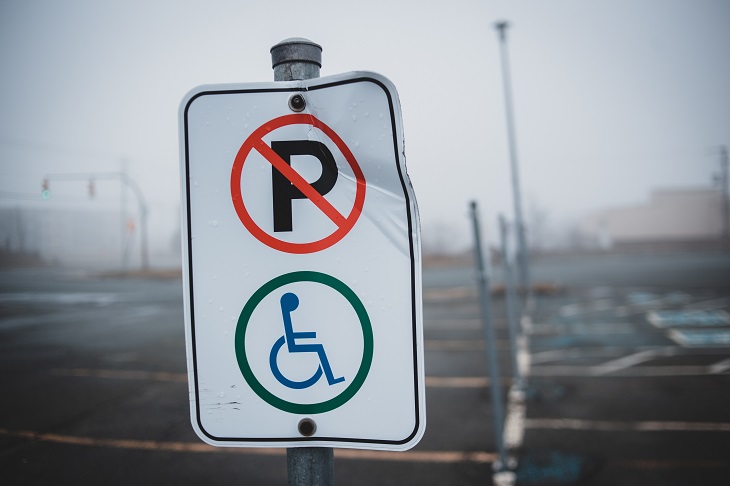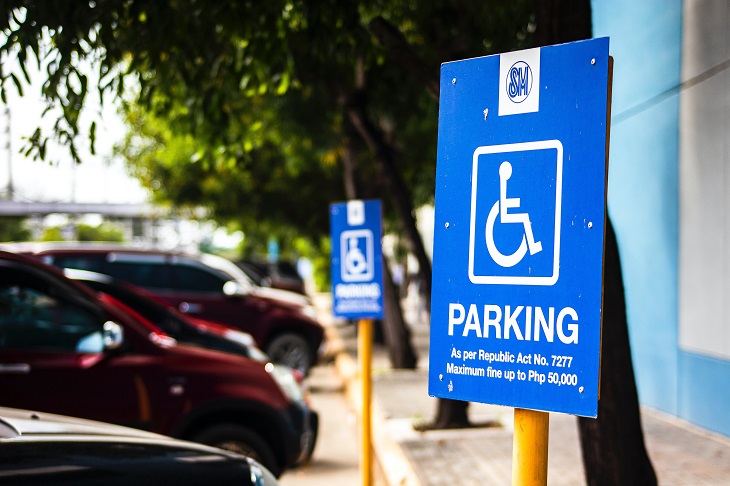The Americans with Disabilities Act (ADA) was signed into US law in 1990 to ensure equal rights and access to people with disabilities. One important aspect of ADA compliance is providing accessible parking spaces. These spaces are more than just painted lines on the pavement — they’re a symbol of inclusion and accessibility. In this article, we’ll explore the importance of ADA compliance in handicap parking spaces and its impact on the lives of those who rely on them.
Accessible Parking and Equal Access Under ADA
The ADA was created to eliminate discrimination against people with disabilities and promote inclusion in society. Compliance goes beyond regulations. It means upholding principles of inclusivity, equality, and respect for individuals with disabilities — and handicap parking spaces play a pivotal role.
Handicap parking spaces are a tangible representation of this commitment to equal access. When parking lots and facilities comply with ADA standards, they provide an equitable opportunity for everyone to access businesses, services, and public spaces.
Handicap Parking Regulations and ADA
One of the most compelling reasons to adhere to ADA requirements for handicap parking spaces is the legal requirement. Businesses, public facilities, and parking lot operators are legally obligated to adhere to ADA regulations. This includes dimensions, signage, and proximity to entrances, among other details.
The legal implications of non-compliant parking areas can include fines, legal action, and a tarnished reputation. Complying with ADA standards not only prevents legal troubles but also demonstrates a commitment to inclusivity.
Benefits of ADA-Compliant Parking Spaces
ADA-compliant parking spaces are designed with specific dimensions and features to accommodate individuals with disabilities including wider parking spaces, adjacent access aisles, and curb cuts.
These accommodations make it easier for people with mobility challenges to enter and exit their vehicles safely. Failure to provide these features can create significant barriers for those who need them.
Why ADA Compliance Matters In Parking Areas
Safety is a paramount concern when it comes to ADA compliance in handicap parking spaces. ADA regulations are created to ensure the safety of both disabled and nondisabled people.
Accessible parking spaces are strategically located near building entrances, reducing the distance people with disabilities need to travel. This minimizes the risk of accidents and increases overall safety in parking lots. It’s also not just a matter of physical comfort — it’s a recognition of their dignity and the importance of their participation in everyday life.
Avoiding Accessibility Challenges
Ensuring ADA compliance for handicap parking can prevent accessibility challenges for individuals with disabilities such as difficulty getting in and out of vehicles, navigating obstacles in parking lots, and increased risk of injury.
ADA-compliant spaces, on the other hand, are designed to eliminate or reduce these challenges, making daily life more manageable for those who rely on them.
ADA and The Significance of Handicap Parking
Compliance is not just about adhering to regulations — it’s also about demonstrating social responsibility. Businesses that prioritize accessibility show their commitment to serving a diverse customer base. This can enhance their reputation and customer loyalty while also supporting an inclusive society.
Meeting Customer Needs
Approximately 61 million adults in the United States live with disabilities, according to the Centers for Disease Control and Prevention. By improving accessibility through ADA-compliant parking, businesses and facilities can cater to the needs of this significant customer demographic — increasing foot traffic, revenue, and customer satisfaction.
Accessible parking also provides convenience and safety for customers with mobility challenges, enhancing their overall experience. It’s a customer-centric approach that builds customer loyalty, ultimately attracting a broader customer base.
It also aligns with the principle of equal access and ensures that businesses are welcoming and inclusive to all, showing they value each customer’s unique needs and are dedicated to their comfort and satisfaction.
Economic Benefits
The economic benefits of ADA compliance in handicap parking spaces are substantial.
Accessible facilities attract a diverse and skilled workforce, which can lead to enhanced productivity and innovation. ADA compliance also mitigates the risk of costly lawsuits and fines, ultimately protecting a business’s bottom line.
While some may view ADA compliance as an expense, it can also be viewed as an investment. Approximately one in four adults in the United States has some form of disability, making them a significant consumer demographic. By accommodating these customers, companies can increase foot traffic and revenue.
Businesses that provide compliant parking spaces tap into a larger customer base. When businesses and municipalities make their spaces more accessible, they open their doors to a wider customer base which can result in increased revenue and economic growth.

Reputation and Brand Image
ADA compliance in handicap parking spaces can significantly impact an organization’s reputation and brand image, fostering a culture of empathy and understanding.
Word of mouth travels quickly, and people are more likely to support businesses that demonstrate a commitment to inclusivity. Negative experiences related to accessibility can harm a company’s reputation, so committing to ADA compliance is an investment in a positive brand image.
Building a More Inclusive Society
Ultimately, ADA compliance in handicap parking spaces is about building a more inclusive and equitable society. It’s about recognizing the value and potential of every individual, regardless of their physical abilities.
Accessible parking spaces are a symbol of our commitment to ensuring that everyone can participate fully in all aspects of life. It contributes to a society where everyone, regardless of their physical abilities, can enjoy the same rights and opportunities, fostering a more compassionate and equitable world.
***
The importance of ADA compliance in handicap parking spaces cannot be overstated. It is a legal obligation, a commitment to equal access, a demonstration of social responsibility, and a means of enhancing safety and convenience for individuals with disabilities.
By prioritizing ADA compliance, businesses and organizations not only avoid legal troubles but also contribute to a more inclusive and welcoming society. Accessible parking spaces are not just lines on the pavement; they are pathways to equality and dignity for all.
Featured image by Marcus Aurelius on Pexels.




